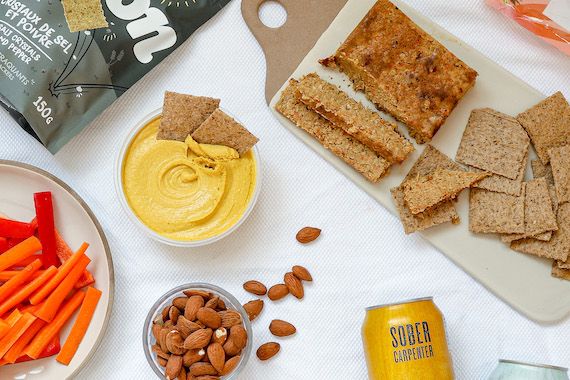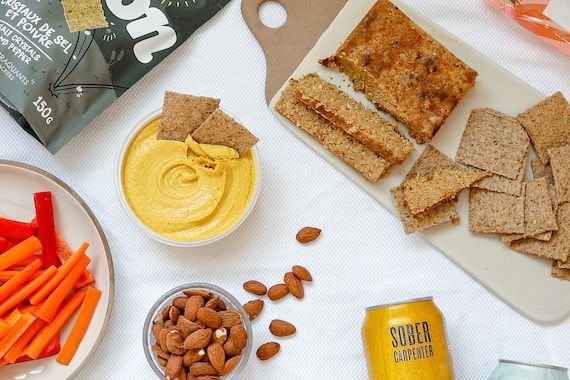
(Photo: Facebook)
LANAUDIÈRE REGIONAL FOCUS. Changes are on the agenda in 2023 for Frenchman Patrick Mougin, co-founder and president of Alice & Ambre, who fell in love with the Lanaudière region during a home exchange. His young company, founded in 2020, produces Rebon crackers – and since March, tortilla chips – from grain residues from alcohol production.
Patrick Mougin has also been co-owner of the Malstrom microbrewery, established in Notre-Dame-des-Prairies, near Joliette, for eight years. “Like many breweries in the countryside, we had the opportunity to give our threshing (residues from grain production) to farmers to feed their livestock,” he explains. Until his partner Jean-David Camus brought the Résurrection brand aperitif from France, made from the brewery’s wort. Thus was born the idea of using these leftovers from beer production to fill those little hunger pangs with healthy and delicious snacks.
Following an economic feasibility study carried out by the agri-food research institute Cintech, Patrick Mougin began developing crackers based on thresh in the food processing workshop of the La Boîte à start-up in Berthierville. The pandemic halted development for several months due to insufficient access to these spaces. “Even though everything was not in place, we decided to take the plunge and create our company in October 2020,” says the entrepreneur, who currently employs three people, including two dedicated to production in his workshop in Saint-Ambroise of Kildare.
A new image to expand your market
The first packages of Rebon biscuits were launched in autumn 2021 and were available in four, then seven flavours. “After this launch, we understood that our brand image, deliberately placed between the cracker and the chip, was not good from a marketing point of view, because the consumer needs to identify one of the two uses,” says Patrick Mougin, who revised the visuals of his cracker packages, in addition , that he launched his first tortilla chips.
Alice & Ambre, which distributes its products to around a hundred outlets such as some IGAs and Métros, delicatessens, big-box stores, bakeries, cheese shops, etc., launched its online store in March. The company is also reaching out to hotels, restaurants, and educational and healthcare facilities such as hospitals and kindergartens to offer individual portions of the cookies. “It’s a bit of a chicken and egg story for a small business like us to be present in these circles!” says the businessman. You must have a distributor, but they need to know who our customers are in these sectors before they refer to us. » But the door to these circuits is opening with Rebon products, which will soon be distributed in some CIIIS and CIUUS and are in the testing phase on the dining trays of Sainte-Justine Hospital in Montreal.
Automate to ensure competitive pricing
Patrick Mougin is all the more inclined to expand his clientele as he completes the installation of custom automation equipment. “We are making the final adjustments that will allow us to produce economically and quantitatively,” rejoices the man who planned this step even before his company was founded. “Recycling the mash requires converting it immediately after cooking to preserve its quality and prevent rapid degradation,” he says. This means the ability to quickly transform it and thereby automate production for reasons of efficiency and price competitiveness. »
To reduce energy consumption and costs, Patrick Mougin collects and transforms the mash into a paste at the exit of the brewing system without going through the drying process. It comes from two breweries (including his) and a distillery in the region.
Thanks to its new image and automation, the young company plans to triple its turnover in 2023 by producing 23 tons of crackers and recycling 15 tons of threshing compared to 2022, before doubling it in 2024. a new flavor for the entrepreneur who plans to explore recipes containing “ugly vegetables” or the sweet line. “2023 is like a second birth for us,” he says. A four-year effort will come to fruition. »
This text was originally published in the April 12, 2023 paper edition.
